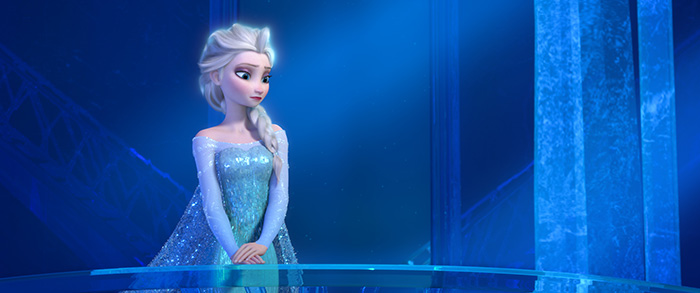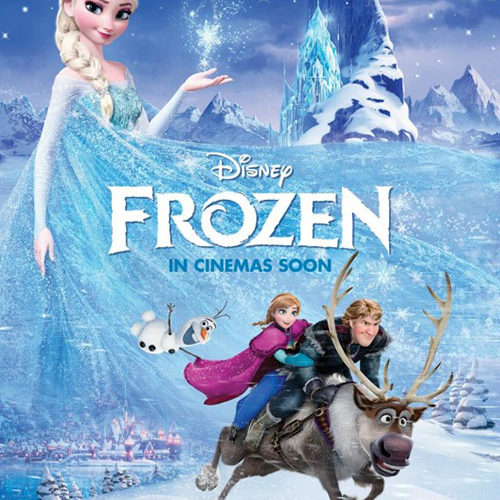Over half a century in the making, Disney’s adaptation of Hans Christian Andersen’s The Snow Queen has finally made it to the big screen. It was 1943 when Walt Disney and Samuel Goldwyn decided to co-create a live-action/animation hybridized biography of the Danish author—an idea that stalled due to their inability to bring the aforementioned fairy tale and The Little Mermaid to life. While Disney figured out the latter in 1989, the former continuously proved troublesome as it failed to come together in both the 1990s and 2000s, with its most recent stint in turnaround coming after a version from Beauty and the Beast’s creative team (Gary Trousdale, Kirk Wise, Linda Woolverton, and Alan Menken) fizzled. Interestingly enough, what eventually evolved into Frozen remains very much a kindred spirit to that Best Picture Oscar nominee.
Ultimately written by Wreck-It Ralph co-writer Jennifer Lee (who was also awarded co-director status with Chris Buck), this tale of two young princesses had me remembering moments in Beauty and Beast throughout. Whether Anna’s (Kristen Bell) “First Time in Forever” recalling Belle’s “Belle (Little Town)” and its excited wonderment at an outside world so different from the one she lives; the fact that her sister Elsa (Idina Menzel) must hide in the kingdom’s castle so nobody will find out about her magical powers and hunt her down as a monster like the Beast; or the Duke of Weselton (Alan Tudyk) hatching plans and ultimately riling up the townspeople with fear-mongering a la Gaston, the similarities are uncanny. Even the comic relief snowman Olaf (Josh Gad) is an inanimate object brought to life in service of his mistress.

But while certain plot points may overlap, Frozen stands on its own by utilizing some brilliant bait and switches to keep us in the dark as to its main conflict until the last possible moment. One would assume Elsa to be the unwitting villain since her Snow Queen counterpart is in Andersen’s original work, but things aren’t so simple with her as our heroine’s sister. Elsa may ultimately freeze Arendelle’s fjords by turning summer into winter, but she had no malicious intent. After her parents enlisted a wise old troll (Ciarán Hinds’ Pabbie) to thaw Anna’s mind when Elsa accidentally froze her during playtime, they quarantined the older girl until she could control herself. That isolation—especially after their parents’ untimely death—unfortunately only found her even more unpredictable once the castle doors opened for her inevitable coronation.
This is where Elsa exposes her powers to scare everyone but her sister into believing she is evil. Anna leaves new fiancé Prince Hans (Santino Fontana) in charge despite only meeting him that morning and sets off to bring the new queen back. She meets the hard-working but sheltered Kristoff (Jonathan Groff) and his reindeer steed Sven on the way, buying his help to guide her towards the North Mountain where her sister has constructed a massive ice castle to serve as her self-imposed prison. Hans attempts to hold things together in Arendelle, the Duke sends his men with a search party to kill the new queen, Anna gets stung in the heart by Elsa’s frozen touch, and a race against time begins to save both girls and lift the wintery curse upon their people.

It all happens fast with everyone’s return home readying the fall of dominos that finally uncover the story’s true threat. So while Frozen may not be the most complex of Disney’s films in terms of scope, it definitely makes up for it in sheer exhilaration and entertainment with Anna becoming the latest in a welcome line of “princesses” who are more than mere damsels in distress. Bell’s infectious charm and awkwardly cute mannerisms come through tenfold as her character relentless operates at 120% like the film itself, never resting to take a breath or think things over when the excitement of action achieves her desired results much quicker. Just as her exuberance led Elsa to hurt her as a girl, such an adrenaline-rush mentality can place you into situations you’re simply unprepared to overcome.
Even at her weakest, though, Lee and Buck make sure she won’t go down without a fight. Anna may have her pick of strapping suitors in Hans and Kristoff, but the filmmakers aren’t interested in telling the usual boy meets girl synopsis we’ve come to expect. Making Anna and Elsa sisters not only forces Disney to put “inspired by The Snow Queen” in the credits rather than “based on,” it also adds the new relationship dynamic introduced by Brave’s mother/daughter core. Both that Pixar film and Frozen depict the bond of familial trust and love despite surface appearances wanting them to become our good versus bad billing. It’s their unspoken acknowledgement of each other’s heart and soul that provides the subtle wrinkle to keep their story’s eventual trajectory more or less hidden as a result of it potentially going either way.

The more Disney does it, the more I’ll guess it’s happening—but for now it’s still a fresh plotting device that adds a lot to my enjoyment of this new renaissance that began with Tangled. While some of the songs by Kristen Anderson-Lopez and Robert Lopez are rough around the edges (although I liked Menzel’s “Let It Go”) and the trolls are a bit excessive and perhaps unnecessary besides added cuteness, there are many aspects that will surprise or even awe one too. For one, despite my worry that Olaf the Snowman looked unsalvageable in the marketing materials, Gad somehow infuses his naïve idealist with childlike glee and iconic humor. And as far a world of ice being bland, the animators’ use of Quebec’s Ice Hotel and Norway as inspiration renders the frosty translucency a glory to behold.
While it won’t go down as one of Disney’s greatest animations, Frozen has enough charm and silliness—a word I use complimentary—to make it a must-see for families. Kristoff provides a more sensitive masculinity for young boys to learn from while Anna and Elsa both provide girls complex role models strong enough to know asking for help won’t subvert their independence as well as unafraid to tackle anything head-on. Many have labeled the film feminist, but I wonder if it’s even more than that. Every character—male or female—shows himself/herself to have the moxie necessary for saving the day. It’s not that one shields the other or vice versa, they just progress through their struggles in authentic, humanistic, and compassionate ways. Anna shouldn’t be pigeonholed as a “princess” or “heroine.” She’s a human being capable of greatness boys and girls alike should aspire to follow.
Frozen opens wide on Wednesday, November 27th.

